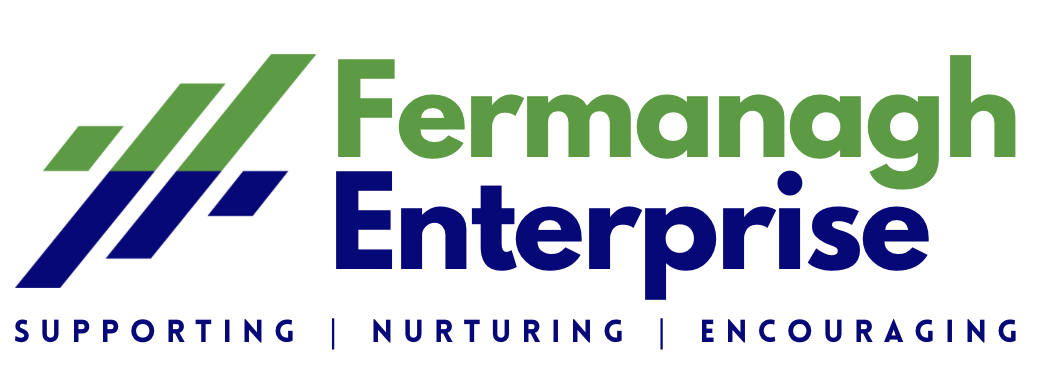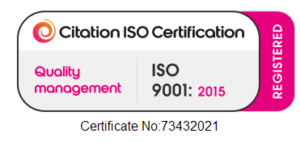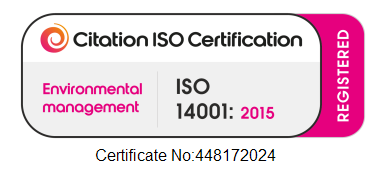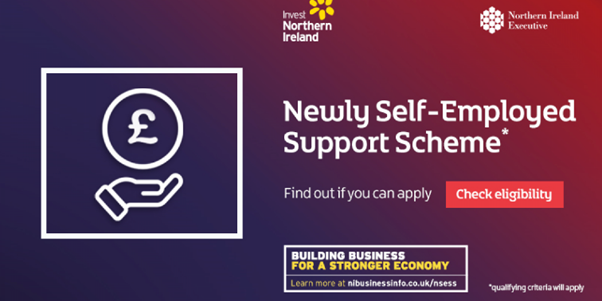The Minister for the Economy has launched the Newly Self-Employed Support Scheme, designed to provide support to newly self-employed individuals (sole traders and those in partnerships) who have been adversely impacted by COVID-19.
The scheme is administered by Invest Northern Ireland on behalf of the Department for the Economy.
What is available?
The Newly Self-Employed Support Scheme (NSESS) will offer an initial one-off taxable grant of £3,500 to newly self-employed individuals (sole traders and those in partnerships) that meet the criteria outlined below.
NOTE: This scheme will close to applications at 6pm on Friday 5 February 2021.
Who is eligible?
NSESS is open to sole traders or individual members of a partnership business operating in Northern Ireland.
You must be able to demonstrate that you (as the individual) meet the following criteria:
- You have commenced trading as self-employed between 6 April 2019 and 5 April 2020.
- You have been trading at 1 March 2020 (prior to the COVID-19 pandemic).
- You have either been temporarily unable to trade or are currently trading but impacted by reduced demand, due to the COVID-19 pandemic.
- Over 50% of your income in 2019/20 was from self-employment. If you moved from paid employment (PAYE) to self-employment during 2019/20, you do not need to take into account the income from the paid employment when calculating this percentage. However, you will need to submit your P45 from your previous employer as evidence to support this.
- Your 2019/20 trading profits were less than £50,000. In the case of a partnership business, this refers to your share of the trading profits as outlined on your individual tax return.
- You have experienced at least a 40% decline in trading profits between 1 March and 30 November 2020, i.e. your trading profits over this period are at least 40% lower than they would have been in the absence of the COVID-19 pandemic.
- You are able to provide the following:
- 10-digit HMRC Unique Taxpayer Reference (UTR) linked to Schedule D earnings from any trade or profession.
- HMRC VAT Registration Number, if you are VAT registered.
- You intend to continue to trade as a sole trader or individual member of the partnership.
Who cannot apply?
A sole trader or individual member of a partnership business is not eligible for NSESS if:
- You commenced trading outside the timeframe of 6 April 2019 and 5 April 2020.
- You submitted a tax return which included income from self-employment for 2018/19.
- You have received support from the Self-Employment Income Support Scheme (SEISS).
- Your business has failed to comply with a COVID-19 prohibition notice, served by the Police Service of Northern Ireland (PSNI), under regulation 7 of The Health Protection (Coronavirus, Restrictions) Regulations (Northern Ireland) 2020(b).
- The grant to be paid to the business will mean it will exceed the maximum level of State Aid permitted under the EC’s de Minimis Regulation (PDF, 835K). The State Aid de minimis ceiling is €200,000 over the three previous consecutive fiscal years.
Further information about this scheme is available in the Newly Self-Employed Support Scheme Guidance Notes (PDF, 450K).
How you can prepare to apply
Your first step is to find out if you are eligible for NSESS.
Check eligibility and apply online
If you are eligible to apply, here are some steps you can take to prepare for completing the online application form.
You will need to provide:
- Your business name (or your own name if this is what you trade under).
- Your contact name and number.
- Your business address and postcode.
- Your bank account number and sort code for a UK or Sterling account used for trading purposes.
- Your 10-digit HMRC Unique Taxpayer Reference (UTR) linked to Schedule D earnings from any trade or profession.
- Your HMRC VAT Registration Number, if you are VAT registered.
- Confirmation that you are a sole trader or an individual in a partnership business. Limited companies and trusts are not eligible for NSESS.
- Confirmation you commenced trading between 6 April 2019 and 5 April 2020. Sole traders and partnership businesses that commenced trading outside this timeframe, including those submitting tax returns for self-employment income during 2018/19, are not eligible for NSESS.
- Confirmation as a sole trader or an individual in a partnership business:
- you were previously trading in the period 6 April 2019 to 30 November 2020 but are temporarily unable to trade due to the COVID-19 pandemic; or
- you are currently trading but impacted by reduced demand, due to the COVID-19 pandemic; and
- you were trading at 1 March 2020 (prior to the COVID-19 pandemic).
- Confirmation as a sole trader or an individual in a partnership business:
- You intend to continue to trade.
- Your 2019/20 trading profits, or share of profits, were less than £50,000.
- Over 50% of your 2019/20 income was from self-employment or that you moved from paid employment (PAYE) to self-employment during 2019/20.
- You suffered at least a 40% decline in trading profits between 1 March and 30 November 2020 – i.e. your trading profits over this period are at least 40% lower than they would have been in the absence of the COVID-19 pandemic.
- Confirmation you have not been able to access support from the Self-Employment Income Support Scheme (SEISS).
You will also need to provide electronically:
- A clear and legible scanned, photograph or screenshot copy of your SA250*. This should show your Unique Taxpayer Reference (UTR), as well as your name and address. And, a clear and legible scanned, photograph or screenshot copy of your 2019/2020 HMRC tax calculation document (SA302) – linked to Schedule D earnings if you have submitted your 2019/2020 self-assessment return.
- If you have submitted a 2019/2020 tax return, you will need to provide evidence of either of the following:
- A clear and legible scanned, photograph, or screenshot copy of your SA250* (dated after 5 October 2019), together with a copy of your SA302 for 2019/2020. While not mandatory, you may also wish to provide independent confirmation from a registered accountant using the template provided on their official letterhead. This could speed up the processing of your application.OR
- A clear and legible scanned, photograph, or screenshot copy of your SA250* (dated before 5 October 2019), together with a copy of your SA302 for 2019/2020. You must also provide independent confirmation from a registered accountant that you commenced trading between 6 April 2019 and 5 April 2020. You will need to submit this using the template provided on their official letterhead.
- If you have not submitted a 2019/20 tax return, you will need to provide a clear and legible scanned, photograph, or screenshot copy of your SA250* (dated after 5 October 2019) together with confirmation that you will submit a Self-Assessment Tax Return for 2019/20 by 31 January 2021. You will also need to submit independent confirmation from a registered accountant that you commenced trading between 6 April 2019 and 5 April 2020 if you do not have a letter from HMRC which confirms the date you started self-employment. You will need to submit this using the template provided on their official letterhead. You will be asked to submit a copy of your SA302 for 2019/20 after 31 January 2021 to enable your application to be fully assessed.
- Your 2019/20 trading profits were less than £50,000. This can be confirmed by independent confirmation from a registered accountant using the template provided on their official letterhead, or evidenced by your SA302 for 2019/20.
- Evidence of trading at 1 March 2020. This can be clear and legible scanned, photograph, or screenshot copies of February-March 2020 invoices or receipts for products or services provided.
- If you left paid employment (PAYE) during 2019/20 to take up self-employment please provide a clear and legible scanned, photograph, or screenshot copy of your P45.
- A clear and legible scanned, photograph, or screenshot copy of a bank statement that covers one month between the period 1 September and 30 November 2020. This must be the same account to which the NSESS grant payment will be made. The statement must clearly show your business address; account name, number and sort code; and date of issue of the statement.
- To verify your identity as the applicant, a form of Photographic ID as proof of identity, such as a clear and legible scanned, photograph, or screenshot copy of a valid passport or a current (full or provisional) driving licence photocard. All Northern Ireland full driving licences with an expiry date between 1 February and 31 December 2020 will be treated as valid for a further eleven months. This does not apply to provisional driving licences.
The maximum file size of each attached document is 3MB.
* If you no longer have a copy of the SA250 letter sent to you by HMRC when you registered for self-employment you should contact HMRC requesting a letter to confirm the date you started self-employment.
The Frequently Asked Questions (PDF, 516K) will help you through the application process.
More information
If you have any enquiries about the Newly Self-Employed Support Scheme, complete the online enquiry form or contact the helpline on Tel: 0800 952 4422. Lines are open Monday to Friday 9am to 4:30pm.











